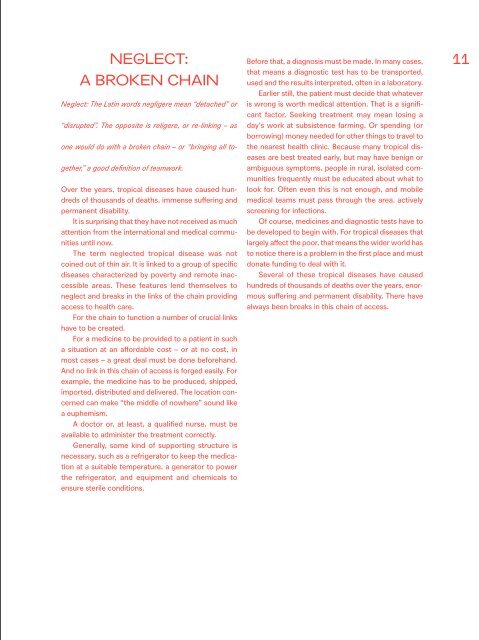You also want an ePaper? Increase the reach of your titles
YUMPU automatically turns print PDFs into web optimized ePapers that Google loves.
NEGLECT:<br />
A BROKEN <strong>CHAIN</strong><br />
Neglect: The Latin words negligere mean “detached” or<br />
“disrupted”. The opposite is religere, or re-linking – as<br />
one would do with a broken chain – or “bringing all together,”<br />
a good definition of teamwork.<br />
Over the years, tropical diseases have caused hundreds<br />
of thousands of deaths, immense suffering and<br />
permanent disability.<br />
It is surprising that they have not received as much<br />
attention from the international and medical communities<br />
until now.<br />
The term neglected tropical disease was not<br />
coined out of thin air. It is linked to a group of specific<br />
diseases characterized by poverty and remote inaccessible<br />
areas. These features lend themselves to<br />
neglect and breaks in the links of the chain providing<br />
access to health care.<br />
For the chain to function a number of crucial links<br />
have to be created.<br />
For a medicine to be provided to a patient in such<br />
a situation at an affordable cost – or at no cost, in<br />
most cases – a great deal must be done beforehand.<br />
And no link in this chain of access is forged easily. For<br />
example, the medicine has to be produced, shipped,<br />
imported, distributed and delivered. The location concerned<br />
can make “the middle of nowhere” sound like<br />
a euphemism.<br />
A doctor or, at least, a qualified nurse, must be<br />
available to administer the treatment correctly.<br />
Generally, some kind of supporting structure is<br />
necessary, such as a refrigerator to keep the medication<br />
at a suitable temperature, a generator to power<br />
the refrigerator, and equipment and chemicals to<br />
ensure sterile conditions.<br />
Before that, a diagnosis must be made. In many cases,<br />
that means a diagnostic test has to be transported,<br />
used and the results interpreted, often in a laboratory.<br />
Earlier still, the patient must decide that whatever<br />
is wrong is worth medical attention. That is a significant<br />
factor. Seeking treatment may mean losing a<br />
day’s work at subsistence farming. Or spending (or<br />
borrowing) money needed for other things to travel to<br />
the nearest health clinic. Because many tropical diseases<br />
are best treated early, but may have benign or<br />
ambiguous symptoms, people in rural, isolated communities<br />
frequently must be educated about what to<br />
look for. Often even this is not enough, and mobile<br />
medical teams must pass through the area, actively<br />
screening for infections.<br />
Of course, medicines and diagnostic tests have to<br />
be developed to begin with. For tropical diseases that<br />
largely affect the poor, that means the wider world has<br />
to notice there is a problem in the first place and must<br />
donate funding to deal with it.<br />
Several of these tropical diseases have caused<br />
hundreds of thousands of deaths over the years, enormous<br />
suffering and permanent disability. There have<br />
always been breaks in this chain of access.<br />
11


